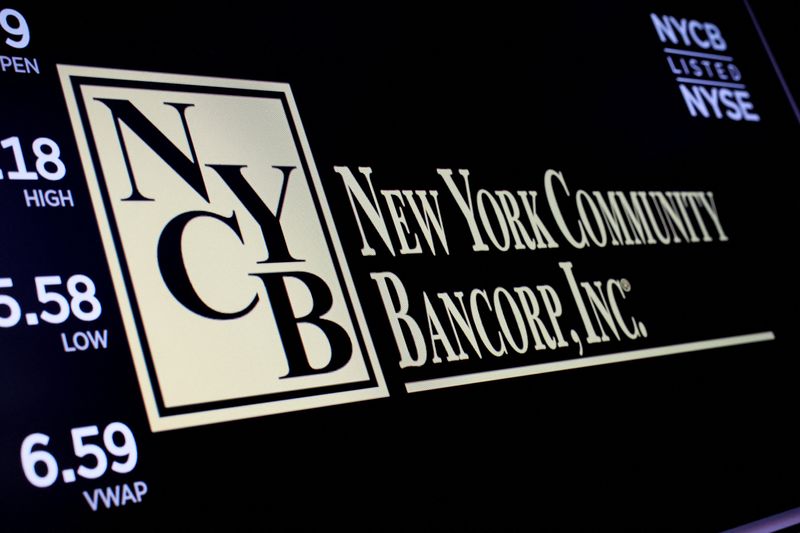By Niket Nishant and Nupur Anand
(Reuters) -Regional U.S. bank stocks sank on Wednesday, dragged by a 38% plunge in the shares of New York Community Bancorp (NYSE:NYCB) after it cut its dividend and posted a surprise loss, renewing fears over the health of similar lenders.
The KBW Regional Banking Index closed down 6%, its biggest one-day drop since March 13 last year after New York's Signature Bank (OTC:SBNY) collapsed amid depositor panic sparked by the failure days earlier of Silicon Valley Bank.
Deposits have since stabilized, but some investors said Wednesday's sell-off highlighted ongoing concerns over regional lenders' health, including that the cost of retaining deposits would squeeze net interest income (NII) which drives lending profits.
"The sector in general is subject to more of an emotional trade simply because depositors can be spooked into feeling like the collapse is imminent. But higher interest rates have been wearing on earnings and NII for a lot of these banks," said Brian Mulberry, client portfolio manager at Zacks Investment Management.
The sell-off seemed to catch the market by surprise.
Traders in options backed by SPDR S&P regional bank exchange traded fund had been positioned with a bullish bias, especially for the near term, Trade Alert data showed.
On Wednesday, those options traded at four times their usual pace as investors positioned for a more gloomy outlook. Put options, typically bought to express a bearish or defensive view, outnumbered calls, generally a bullish play, 3-to-1.
"Many traders believe that warnings of the type we saw from NYCB are like cockroaches - if you see one, there must be more hiding just out of sight," said Steve Sosnick, chief strategist at Interactive Brokers (NASDAQ:IBKR).
Investor jitters were amplified on Wednesday as the Federal Reserve left interest rates unchanged. High rates aimed at taming inflation have weighed on regional bank loan profits, as well as the value of securities they hold.
"The market is also repricing the first rate cut away from March and into May, creating another five months of paying 5%+ to depositors while loan demand is weakening," said Mulberry.
Shares of Valley National Bancorp (NASDAQ:VLY), Citizens Financial (NYSE:CFG) Group, and Regions Financial Corp (NYSE:RF) fell between 4% and 7.8%.
Other analysts and investors, though, said NYCB's problems were mostly idiosyncratic to its balance sheet and that bank shares were not seeing the type of pressure seen in March last year.
"I don't think what we saw in the regional banking space in last March is anywhere on the cards right now," said David Smith, a bank analyst at Autonomous Research.
REGULATORY THRESHOLD
NYCB's shares fell as much as 46% in morning trading, but later pared losses.
Rating agency Moody's (NYSE:MCO) on Wednesday evening said it had placed all long-term and short-term ratings and assessments of the bank and its subsidiary, Flagstar Bank, on review for a downgrade.
The rating action was prompted by the bank's weak earnings, decline in its capitalization and its growing reliance on wholesale funding, Moody's said.
NYCB which bought some of Signature Bank's assets last year, said it was cutting its dividend by 70% and building capital to bolster its balance sheet.
The Signature Bank purchases, along with its 2022 acquisition of Flagstar Bank, pushed NYCB's balance sheet above a $100 billion regulatory threshold that is subject to stricter capital and liquidity requirements. It had assets of $116.3 billion as of December.
"We crossed this important threshold sooner than anticipated as a result of the Signature transaction," New York Community Bancorp (NASDAQ:CTBI) CEO Thomas Cangemi said in a statement.
The shares of some banks just under the $100 billion threshold also fell. Zions, with $87 billion, was down nearly 5.7%, and Comerica (NYSE:CMA), with $85 billion, was down 5.4%.
Ken Usdin, an analyst at Jefferies, said in a research note that crossing the $100 billion threshold is "a reminder for banks to get ready." Usdin noted that Comerica and Zion "had already gone through a rigorous ramp-up of infrastructure for stress testing and other requirements."
NYCB analysts, too, appeared to be caught off guard, and at times appeared frustrated with the bank's management for providing inadequate details, including on its NII forecast.

NYCB posted an adjusted loss of $185 million due to a chunky $552 million provision for credit losses. The lion's share of those provisions was allocated to its commercial real estate portfolio which, as with many lenders, has been under pressure amid lingering pandemic office vacancies.
"It's messy for the shareholders but there’s no spillover. It’s relatively small," said Edward Al-Hussainy, senior interest rate and currency analyst at Columbia Threadneedle Investments.
